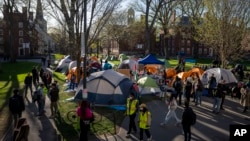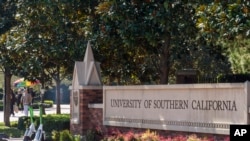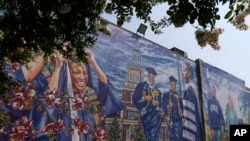Student Union
Are You a Victim of Fake News?

American Politic News
The Hill
The Hill is the real news site. American Politic News is the fake news site! Politifact describes it as "a largely sensational website that post stories with shocking headlines that don't always add up."
The traditional name for fake news is propaganda. Dictionary.com defines propaganda as "information, ideas, or rumors deliberately spread widely to help or harm a person, group, movement, institution, nation, etc." and "the deliberate spreading of such information, rumors, etc.," and "the particular doctrines or principles propagated by an organization or movement."
Satire: Fake New's Funny Cousin
Satire news sites are also something that one has to watch out for. Satire is "a way of using humor to show that someone or something is foolish, weak, bad, etc. : humor that shows the weaknesses or bad qualities of a person, government, society, etc," according to Merriam-Webster.
This is an example of satire from The Onion, one of the most well-known satire sites.
Satire is not meant to mislead like fake news is, but it can sometimes be confusing!
Real or Satire is a website where a URL can be put into a search engine that will tell you if the website you are looking at is satire or not, from the database of satire websites they've compiled.
Detecting Fake News
A Google Doc of "False, Misleading, Clickbait-y, and/or Satirical 'News' Sources" was compiled by Melissa Zimdars, an assistant professor of communication at Merrimack College in Massachusetts. However, the LA Times reported that Zimdars took the list down as a "safety measure in response to threats and harassment," but plans on eventually releasing the list in another format.
However, some websites took issue with Zimdars's original list before it was taken down, because she included aggregate sites. Kira Davis, a reporter for RedState, (one of the listed aggregators), said that "RedState writers go to great lengths to debunk false stories they find in the media," and it is in no way a fake or misleading news site.
Davis isn't the only one with a problem with the list. She cites Mediate's Alex Griswold's tweet, illustrating the dilemma and confusion about what should be considered real or fake.
?ref_src=twsrc%5Etfw
Beyond the controversial attempt at a list of sites, there is still a document Zimdar created with some solid tips on how to analyze news sources.
Some of Zimdars tips include:
- Watching if reputable news sources are reporting on the same story.
- Check the "About Us" tab on their website, or use Snopes or Wikipedia to find background information on the source.
- "Odd domain names generally equal odd and rarely truthful news."
- Bad web design or all caps writing means you should verify what you're reading.
- If the story makes you really angry, Zimdar says, "It’s probably a good idea to keep reading about the topic via other sources to make sure the story you read wasn’t purposefully trying to make you angry."
Media Platforms Fight Back Against Fake News
Politico reported that both Google and Facebook are going to ban fake news sites from using their advertising platforms.
This news comes after Google and Facebook were criticized for distributing fake news during the 2016 election that critics say impacted the outcome.
In 2016, Oxford Dictionary named the word of the year: "post-truth."
Do you know what is real and what is fake news? Comment here and share your thoughts on our Facebook page, thanks!
This story was originally published on November 25, 2016.
See all News Updates of the Day
Malaysian official: Schools can’t turn away from global tensions

Zambry Abdul Kadir, Malaysia’s higher education minister, said protests spreading across universities in the United States show that schools can’t ignore political tensions.
Helen Packer, reporting in Times Higher Education, said the minister reminded educators that universities are key in the development of leaders, individuals and societies. (April 2024)
Social media breaks are difficult, but necessary

Between online classes, maintaining social connections and working on projects, college students can have a hard time disengaging from the demands of technology.
In Florida International University’s PantherNOW, Ariana Rodriguez offers strategies for taking a break from social media. (April 2024)
- By Melos Ambaye
Many master's degrees aren't worth the investment, research shows

Nearly half of master's degrees have a negative financial return, according to new research by the Foundation for Research on Equal Opportunity, an economic research organization.
The study indicates that many graduate degree programs do not increase lifetime earnings enough to be worth it.
While 23% of bachelor’s degree programs yield a negative financial return on investment, 43% of two-year degrees and master’s degrees fail to deliver a return, according to the study by Preston Cooper, a senior fellow at FREOPP.
Cooper assessed the return on investment for 53,000 degree and certificate programs to determine whether a student’s lifetime earnings outweigh program costs and the risk of not completing their degree.
His findings show that a student’s field of study was the overriding indicator of return on investment at the undergraduate and graduate level.
Engineering, computer science and nursing bachelor’s degrees have high financial returns on investment, while programs in education, fine arts, psychology and English usually have low returns.
Graduate degrees in medicine and law tend to have strong payoffs. But a large share of master’s programs, including the MBA, frequently have low payoffs, according to Cooper.
Although workers with master’s degrees earn 16% more than those with only bachelor’s degrees, Cooper says the figure fails to account for students who had “higher preexisting earnings potential.”
“MBA students typically have high preexisting earnings potential, having often chosen high-ROI undergraduate majors such as finance and economics,” Cooper writes. “So the MBA adds little value on top of that.”
The study indicates that high starting salaries are predictors of high returns on investment. Degrees with starting salaries of $57,000 a year or more deliver the best lifetime returns.
But the return on investment of a degree can vary depending on the educational institution.
“Students interested in fields with low average pay can still find some schools that do well transforming those fields of study into high-paying careers,” Cooper writes.
The quality of an institution also matters, said William Tierney, professor emeritus of higher education at the University of Southern California.
“An MBA from Harvard is a likely ticket to a good job,” Tierney told VOA. “An MBA from the University of Phoenix, less so.”
But students pursue graduate programs for more than just financial reasons.
“Some degrees open up careers in fields that students may enjoy, such as in the performing arts,” Robert Kelchen, head of educational leadership at the University of Tennessee, Knoxville, told VOA.
“Others can help gain access to social networks or simply help students learn about a topic that is of interest,” Kelchen added.
Cooper told VOA that it might make sense for students in degree programs with low returns on investment to switch majors if they can still graduate on time.
He found the worst outcome for a student’s return on investment is dropping out of college “because they must pay for one or more years’ tuition and spend time out of the labor force.”
Lawmakers who fund higher education have a responsibility in ensuring “higher education delivers on its promise of economic mobility,” Cooper said.
Nearly a third of federal funding, including Pell grants and student loans, pays for higher education programs that fail to provide students with a return on investment, according to the study.
Cooper’s view is that “some schools should shut down low-ROI programs and reallocate institutional resources to programs with a better return.”
“There's definitely this narrative out there that higher education is always worth it, and you should always try to get that extra degree because it will increase your earnings,” he told VOA. “That's reinforced by colleges who make lofty promises regarding their graduate degree programs' outcomes, which all too often fall short.”
Harvard students end protest as school agrees to discuss Gaza conflict

Protesters against the war between Israel and Hamas were voluntarily taking down their tents in Harvard Yard on Tuesday after university officials agreed to discuss their questions about the endowment, bringing a peaceful end to the kinds of demonstrations that were broken up by police on other campuses.
The student protest group Harvard Out of Occupied Palestine said in a statement that the encampment "outlasted its utility with respect to our demands." Meanwhile, Harvard University interim President Alan Garber agreed to pursue a meeting between protesters and university officials regarding the students' questions.
Students at many college campuses this spring set up similar encampments, calling for their schools to cut ties with Israel and businesses that support it.
The Israel-Hamas war began when Hamas and other militants stormed into southern Israel on October 7, killing some 1,200 people and taking 250 hostages. Palestinian militants still hold about 100 captives, and Israel's military has killed more than 35,000 people in Gaza, according to Gaza's Health Ministry, which doesn't distinguish between civilians and combatants.
Harvard said its president and the dean of the Faculty of Arts and Sciences, Hopi Hoekstra, will meet with the protesters to discuss the conflict in the Middle East.
The protesters said they worked out an agreement to meet with university officials, including the Harvard Management Company, which oversees the world's largest academic endowment, valued at about $50 billion.
The protesters' statement said the students will set an agenda that includes discussions on disclosure, divestment, reinvestment and the creation of a Center for Palestine Studies. The students also said that Harvard has offered to retract suspensions of more than 20 students and student workers and back down on disciplinary measures faced by 60 more.
"Since its establishment three weeks ago, the encampment has both broadened and deepened Palestine solidarity organizing on campus," a spokesperson for the protesters said. "It has moved the needle on disclosure and divestment at Harvard."
Chinese students report interrogations, deportations at US airports

Academics from China are reporting increased scrutiny at U.S. airports, with valid visa holders being interrogated and turned away by Customs and Border Protection Agents.
Phones and laptops have been searched, and researchers have undergone extensive questioning about their work. One graduate student at Yale, who was midway through her PhD, was turned back at Dulles airport and banned from entering the U.S. for five years, according to The Guardian.











